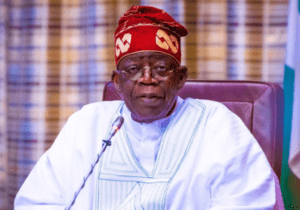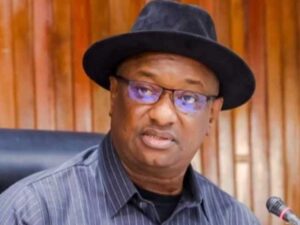Of Abiodun, Ogun and “Budget of sustained growth and development”
By Adémólá Òrúnbon
In Ogun State, at least, the signs of what to come have begun to manifest. The ray of hope appeared on the horizon on Wednesday 30th November, 2023 when the state governor, Prince Dapo Abiodun, presented the 2024 Budget to the state House of Assembly. To say the least, it is obvious that the Ogun State Government did not deceive itself over what the financial environment would look like in 2024. For a state to embark upon its completion of major massive roads construction, rehabilitation, upgrading and maintenance in the state especially for the preparation of hosting 2024 Ogun National Sports Festival comes up on November this year precisely.
Thus, Governor Dapo Abiodun, working closely with appropriate committees of the House of Assembly in preparing the budget, shows that he did not set out to deceive the people of the state. The budget, christened “Budget of Sustained Growth And Development,” has a total estimate of N703 . 03 Billion. While some states might have considered the usual bogus budget estimate that characterised the past years when petrodollar flowed like rain water.
Governor Abiodun chose not to play to the gallery; Ogun State is one of those states in the country where the culture of paying tax is taboo and almost alien to the people. The government has looked inwards and thought out of the box to satisfy its people. The contents of the 2024 Appropriation Bill clearly show that this is exactly what the Abiodun-led administration has done. Among the objectives of the budget were; procurement and installation of transformers – statewide, partner with the private sector for interrupted power supply.
It also covers areas of construction of infrastructure across all Economic Development Clusters – such as Ijebu-Ode, Remo, Magboro, Abeokuta and Imeko. Also, its included the execution of the state’s Multi-Modal Transport Plan, under the Lagos-Ogun Joint Development Commission Initiative, that would take practical steps to extend the Lagos Blue Line Metro Rail Project into Agbara, as well as the extension of the Lagos Red Line Metro Rail Project to Ijoko and Ifo/Kajola area of the state.
In this year’s fiscal budget, priority was also given to the security of lives and property, through the deployment of additional security networks and communication systems procured for security personnel, and the installation of intelligence and on-street transport management and enforcement systems in all three senatorial districts of the state. Affordable housing development is not left out, with the promises to construct over 2,000 housing units in various locations across the State like Warewa, Sagamu, Iperu, Ibara, Ayetoro Road (Abeokuta), OGTV Village, Ijebu-Ode and other areas.
Non availability of portable water would be a thing of the past, as the present administration is working round the clock by carrying out various water reticulation projects to connect more households to potable water supply after completing the Urban Water Supply Project. Also, the youth in the state would be actively involved in Agricultural Development and Food Security through training of youths on digital solutions to enhance youth involvement in agriculture, refurbishment and renovation of technical colleges and vocational centres.
Indeed, education infrastructure development, in terms of construction and rehabilitation of blocks of classrooms, technical workshops and Science laboratories at the primary and secondary schools with the provision of furniture and equipment across the four (4) divisions in the state and the hosting of the 2024 Ogun National Sports Festival would also be executed in the 2024 budget projection for the state, and the introduction of 2-and 3-wheeled electric vehicles in furtherance of the “Go Green” initiatives and the need to reduce transport fares by offering an alternative to petrol by expansion of CNG-fueled routes between major cities in the state.
The development and rehabilitation of logistics parks along major highways and in major locations would also prioritised, so as to make most of the parks, garages and highways across the state a befitting ones, moreover, commencement development of bus/water transportation interchange terminal at Iwopin, and refurbishment and renovation of technical colleges and vocational centres across the State.
Diversification of the economy from Federation Account Allocation-dependent to exploitation of our natural endowments and widening our tax base for the socio-economic development of our dear state and exploitation of raw materials (solid minerals); no pay cut or retrenchment of workers; prompt payment of workers’ salaries, pensions and gratuities of our retired senior citizens; aggressive IGR drive; radical approach to reducing the level of poverty among the citizenry through provision of conducive environment for job creation and wooing of investors from foreign country with the establishment of new Ministries that will be responsible for natural resources and job creation in the state; completion of on-going capital projects for the 2024 Ogun National Sports Festival; effective supervision and monitoring of all government capital projects in the state to enable government get value to taxpayers’ money and on funds expended on projects, development of agriculture so as to ensure provision of enabling environment for food security and growth of agro-based industries with immense private sector participation, among others.
Ogun State government knows that it is imperative that growth and development in the state is inclusive and the connectedness of our Local Government will be covered in this initiative. Some other initiatives to be undertaken by the present Administration includes; reconstruction, rehabilitation and maintenance of Lagos-Ota-Abeokuta Expressway, Ofada-Owode Road, Lagos Garage-Ikangba-Ilese Road, Ota-Lafenwa-Itele-Ayobo Road, Ita Oshin/Ibara-Orile-Ijoga, Orile-Iboro-Imasayi Road, OPIC Estate Internal Road, Agbara, 250km statewide road construction in all three (3) Senatorial Districts and a total upgrading and overhauling of road infrastructure to support the 2024 Ogun National Sports Festival.
With these lofty ideas and objectives, Abiodun explained in his budget speech that “considering the limited resources at our disposal and in order to keep the economy growing and restore the tempo of sustainable development, we have proposed a budget size of N703.03 Billion for the 2024 financial year. With Recurrent Expenditure gulped N287.37 Billion, Capital Expenditure, N415.66 Billion, Overhead Cost, N105.88 Billion, Personnel Cost, N95.05 Billion, Public Debt Charge, N59.09 Billion, while Consolidated Revenue Fund Charges would gulped N27.34 Billion.”
It was stated in the budget that “One hundred point eighty one percent (100. 81 percent) of the budget would be funded by the Internally Generated Revenue (IGR), while N139. 73 Billion will be funded by the Ministries, Departments and Agencies (MDAs), also the Federal Allocation (FAAC and VAT) is expected to fund N182. 05 Billion of the budget respectively.”
The Governor further disclosed that N109, 219.62Billion (16 percent) was earmarked for Education, while N81, 185.66Billion (12 percent) was for Health, N209, 122. 66 Billion (30 percent) was for Infrastructure, Housing and Community Development will gulp N28, 886.42Billion (4 percent), Recreation, Culture and Religion earmarked N22, 872. 69 Billion (3 percent), and Agriculture and Industry was earmarked N14, 213. 03 Billion (2 percent) of the budget estimation.
He further highlighted that Social Protection will gulp N28,692.08 Billion (4 percent), General Public Service-Executive Organ earmarked N31,125.49 Billion (4 percent), General Public Service-Financial & Affairs Fiscal gulped N34, 954.27Billion (5 percent), Public Order & Safety alloted N12,187.63 (2 percent), Economic Affairs allocated N3,083.22 Billion (0.4 percent), General Public Service-General Personnel Service allocated N1,939.79 Billion (0.3 percent), Statewide alloted N104,114.11 Billion (15 percent), while Legislature gulped N14,412.07Billion (2 percent) and the Judiciary was earmarked N7,029.32 Billion (1 percent), making the Ogun state fiscal budget for 2024 total of N703, 028. 01 Billion (100 percent).
It is our prayer that the desire of the current administration in the state not to give the people false sense of financial security will translate to expected results and that the people key into the current economic realities for government to serve them better, and it is our collective responsibility to wish the Governor, House of Assembly Members, Cabinets Members, Civil Servants, Public Servants and the citizens of the state for the well-deserved “Budget of Sustained Growth And Development” and best of this wonderful glorious 2024 Ogun National Sports Festival celebration comes up on November next year and safe landing in the “ISEYA” mantra in Ogun State.
Òrúnbon, a political and Public Affairs Analyst, writes in from Federal Housing Estate, Olomore, Abeokuta, the Ogun State capital. He can be reached via: [email protected], or 08034493944, 08029301122.




